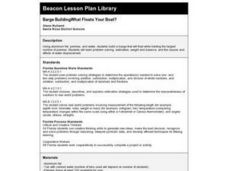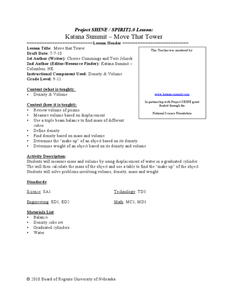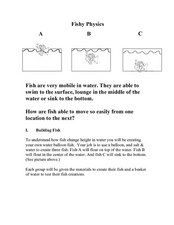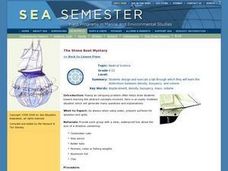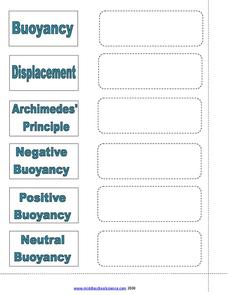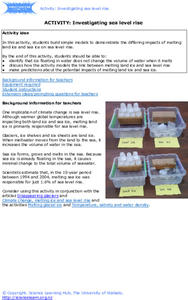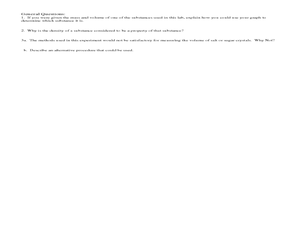Curated OER
Worksheet 26: Vector Force
In this vector force worksheet, students determine the total velocity of objects, the displacement direction, and vector movement. This two-page worksheet provides a total of six multi-step problems.
Curated OER
Density as a Unique Physical Property
Learners find the density of objects by finding their mass and their volume. In this density lesson plan, students determine the mass of objects, the find the volume by using formulas or by water displacement and they calculate the...
Curated OER
Barge Building: What Floats Your Boat?
Students construct aluminum foil boats that float while holding the greatest number of pennies. They investigate the concept of water displacement, record their results, and watch a Bill Nye video on buoyancy.
Curated OER
Move that Tower
Learners investigate ways to find the density of irregular shaped objects. In this physics lesson, students calculate density using its mass and volume. They explain why some objects float or sink in water.
Curated OER
Concrete Canoes
Learners explore and analyze the relationship of buoyancy and displacement needed to make an object float. They examine various boat designs, then design and build clay and aluminum boats that hold a cargo of marbles.
US Environmental Protection Agency
Sea Level: On the Rise
With the global temperature on the rise, the effects of climate change are starting to be seen. However, many people have a difficult time conceptualizing the long-term effects, such as sea levels rising. Given an easy and effective...
Curated OER
Archimedes' Principle
For this Archimedes' principle worksheet, learners answer 13 questions about the concepts of Archimedes' principle such as water displacement, buoyancy and force. The answer questions from a lab they did in class to simulate Archimedes'...
Curated OER
1st Grade - Act. 19: Will it Float?
First graders drop items into water, and discuss why some things float and others sink.
Curated OER
Fishy Physics
Students explore how fish are able to move easily from one depth to another in water. For this fish lesson students create their own balloon fish.
Santa Monica College
The Density of Liquids and Solids
There are underwater rivers that flow on the ocean floor thanks to a difference in density. Scholars learn about the density in both liquids and solids in the second lesson of an 11-part series. They then determine the density of water,...
DiscoverE
Foil Boats
How many pennies can an aluminum foil boat hold? That is the challenge in a collaborative activity designed to explore the concept of buoyancy. Learners use aluminum foil to build makeshift boats and test the weight they hold before...
Teach Engineering
Density Column Lab - Part 1
Mass and density — aren't they the same thing? This activity has groups use balance beams and water displacement to measure several objects. The pupils use the measurements to calculate the density of the objects.
Discovery Education
Future Fleet
Turn your pupils into engineers who are able to use scientific principals to design a ship. This long-term project expects pupils to understand concepts of density, buoyancy, displacement, and metacenter, and apply them to constructing a...
Teach Engineering
Rock and Boat
Present the class with a question on whether the water level of a pond will rise they take a large rock out of a boat and drop it into the pond. Groups come down on all sides of the question and try to justify their answers. The activity...
CK-12 Foundation
Butterfly Stroke
Swimmers improve their times by understanding the physics of their sport. As a swimmer moves through the water, the efficiency of motion affects the resulting velocity. Through an interactive simulation, pupils change the level of motion...
Curated OER
Water: The Neutral Substance
In this water activity, high schoolers read about hydrogen bonds in water and the differences in electronegativity between the oxygen atom and the two hydrogen atoms in water. Students answer four questions about the structure of water...
Curated OER
2001 U.S. National Chemistry Olympiad Part III
Here is a comprehensive method for assessing chemistry learners' knowledge; have them approach two laboratory problems, plan their methods of solving each, and then actually carry out the experiments to find the answers. Both the...
Curated OER
Water Quality Monitoring
Students comprehend the four parameters of water quality. They perform tests for salinity, dissolved oxygen, pH and clarity or turbidity. Students comprehend why scientists and environmental managers monitor water uality and aquatic...
Curated OER
Summary of Organic Reaction Mechanisms Needed for AS Chemistry
Advanced chemistry courses typically cover organic reactions. On this reference sheet, the five types of organic reaction mechanisms are explained and an example is shown. For each, there is also a diagram of the chemical reaction...
Curated OER
The Stone Boat Mystery
Students design and execute a lab through which they study the distinctions between density, buoyancy, and volume.
Curated OER
Buoyancy
In this buoyancy worksheet, learners match the definitions given to the 6 terms associated with buoyancy, displacement, and Archimedes' principle.
University of Waikato
Investigating Sea Level Rise
Find an explanation for the sea level rise. Pupils investigate the difference that melting land ice and sea ice have on the sea level. Groups create two models—one with ice on land and one with ice in the water. As the ice melts, teams...
Curated OER
Volume
In this volume lab worksheet, learners are guided through an experiment to determine volume of a liquid. Students determine water displacement. Learners use a formula to calculate volume of a solid figure.
Curated OER
Mass and Density of an Irregular Solid
In this physics worksheet, students determine the density of irregular solids using water displacement method to complete 7 problems and short answer questions.
Other popular searches
- Water Displacement
- Volume Water Displacement
- Volume by Water Displacement
- Measuring Water Displacement
- Water Displacement Method
- Volume Displacement of Water
- Water Displacement Math
- Mass vs. Water Displacement
- Mass vs Water Displacement




